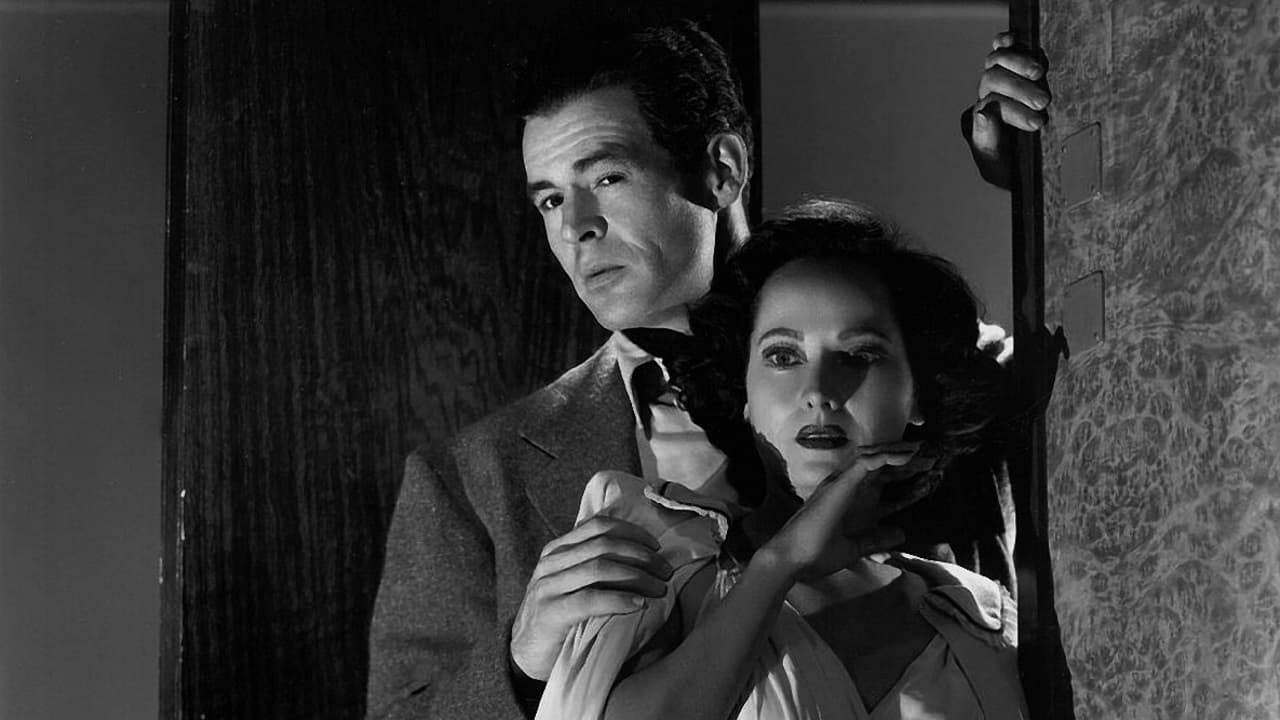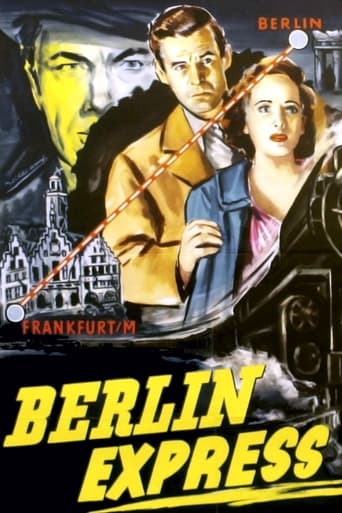



The performances transcend the film's tropes, grounding it in characters that feel more complete than this subgenre often produces.
View MoreIt's a mild crowd pleaser for people who are exhausted by blockbusters.
View MoreThe acting is good, and the firecracker script has some excellent ideas.
View MoreYes, absolutely, there is fun to be had, as well as many, many things to go boom, all amid an atmospheric urban jungle.
View MoreDespite finding Valley of Hell and Carnival of Sinners to be extraordinary films by his dad Maurice,I for some reason have never got round to seeing a title from Jacques Tourneur.Taking a look at the TV listings,I was pleased to find that the BBC were doing a Jacques Tourneur double bill,which led to me getting on the express.The plot:Going on the Express train to Berlin,the passengers find themselves having to mix with other reps of nations occupying Germany. Mistrusting him due to him never coming out of his carriage,the group are surprised to find out that potential peace maker Dr. Bernhardt.Despite their side having recently lost,a secret Nazi blows up Bernhardt's carriage. Pushing for answers, Robert Lindley,finds out that the man was an impostor,and that Bernhardt and his secretary Lucienne were pretending to be fellow passengers. Believing that he has escaped the Nazi assassins, Bernhardt crosses paths with old friend Walther,who reveals to Bernhardt that he has not gotten off the tracks.View on the film:For the opening 30 minutes,director Jacques Tourneur & cinematographer Lucien Ballard (aka:the-then Mr Merle Oberon ) intercut their moody Noir espionage with startling footage of Berlin's "Russia zone." Given the unique chance of being the first Hollywood production shot in post-war Germany and the first movie to be allowed to film in Russia's "zone" Tourneur sadly lets the chance slip out of frame.Going for a tell and show approach, Tourneur clips the Film Noir anxiety by layering Paul Stewart's narration on thick,which does not add a psychological depth to what is being shown,but just describes the images!Stopping the narration once everyone is gathered, Tourneur walks in the shadows of war-torn Berlin and Frankfurt ,casting the shadows from the destroyed buildings down on the group attempting to rid the final Nazi gasps. Dancing in the underworld of the cities in seedy nightclubs, Tourneur explores every corner with sharp tracking shoots that follow Walther sinking into the post-WWII darkness. Calling out a sincere message of unity and understanding between the occupying nations,the screenplay by Harold Medford and Curt Siodmak avoid the message becoming sickly sweet, by placing it in a gang on a mission Film Noir. Brilliantly expressing the abrasive relationship between the occupying nations allegorically on the train, the writers whip up a Film Noir storm,as Dr. Bernhardt starts to regret giving lifelong friend Walther his trust.Although carrying a poor French accent, Merle Oberon gives a sparkling performance as Lucienne,who is given an enticing flirting side by Oberon,which mask her quick-witted Femme Fatale skills.Joined by a superb support cast that include Charles McGraw and a worn-down Reinhold Schünzel as Walther, Robert Ryan gives a great, chiselled performance as Lindley. Initially being firm- handed with his opinions,Ryan wonderfully brings an ease to Lindley,as he realises that he has to work with others to keep the Berlin Express on track.
View MoreI was looking forward to this movie. It seemed promising and I had hoped for a "The Lady Vanishes" type of mystery thriller. Jacques Tourneur directed the film - the man behind "Cat People", "I Walked with a Zombie" and "Out of the Past" - all excellent films that I love."Berlin Express" was sadly disappointing to see. The film is for the most of the time not set on a train and was not very exciting at all. Only the sequence in the brewery was ingeniously filmed. The rest of the film was all talk!!!The cast was not the most memorable and Merle Oberon seemed miscast. But the real star of the film is the photography of the ruins of Frankfurt and Berlin which is fascinating to see. See the film for that alone because the film is short on suspense. The plot was tedious relying very much on coincidence and I never cared for the characters.
View MoreFirst-rate noir, one of many to unfold within the ominous mood of war-torn Europe (with the standard of such fare being set by next year's THE THIRD MAN). It is also one of several emanating from this era to follow a documentary-style pattern – which, however, renders it heavy-going in this case and is ultimately what dates it most of all. The title ranks it besides among a number of espionage thrillers set aboard a train; again, the template for these is THE LADY VANISHES (1938), with which this even shares one of its actors (Paul Lukas, still traveling incognito but now being the abducted party rather than the one doing the kidnapping!).Having mentioned Hitchcock's film, this is yet another effort by director Tourneur in that tradition (incidentally, he followed it with the recently-viewed CIRCLE OF DANGER [1951] and NIGHT OF THE DEMON [1957], co-scripted by Hitchcock regular Charles Bennett). In fact, the plot basically resolves itself in a handful of striking suspense sequences: an explosion in a train compartment; a kidnapping at a busy train station; a 39 STEPS-like 'memory test' in a club; a showdown in an abandoned brewery; and a near-strangling during yet another train journey ingeniously reflected in the glass of a parallel sleeping-car.The rest of the cosmopolitan cast includes American Robert Ryan (by now growing nicely as a leading man), 'French' Merle Oberon (amusingly, she confounds her fellow passengers by alternating between languages when they initially try 'hitting' on her; even if lovingly photographed by cinematographer husband Lucien Ballard, she is perhaps over-age to fill the romantic interest spot and is saddled throughout with a silly feathered hat!), Frenchman Charles Korvin (effectively emerging as the real villain of the piece), Briton Robert Coote (usually there to provide comic relief, he plays it reasonably straight in this case) and, in what constitutes a bit part (as a murder victim), German Fritz Kortner; conversely, future genre stalwart Charles McGraw's not negligible role as a high-ranking U.S. military officer is bafflingly unbilled!
View MoreLike the curate's egg, parts of Berlin Express are excellent. But the other parts? Be prepared for conscientious lectures, conventional and dull, about how life might be for us all if the U.S., Britain, France and the Soviets could work together and be jolly doing it. Divided Germany right after WWII is the subject, but we get the idea: We all just need to be friends. An anonymous narrator keeps telling us this, as well as pointing out what we're already seeing. It's no accident, I think, that Dore Schary supervised the making of this movie. If there was any possibility of pounding inspiring messages into an otherwise good movie, Schary was the producer with the mallet. Imbedded like those old-time prizes in clumps of stale, sticky Cracker Jack are the good parts. These are worth digging for. We're in the middle of a Nazi plot to keep the victors from working together, all to better the chances of these grubby but dangerous survivors of the Third Reich to divide and conquer. The humane Dr. Bernhardt, a German who opposed Hitler and survived, is on a mission from Paris to Berlin by train to address an international conference on his plans for a unified and democratic Germany. There's a plot to kill him. When a grenade on a snack tray goes off in Dr. Bernhardt's compartment...is it good-bye, Dr. Bernhardt? Four travelers on the train, strangers to each other, find themselves thrown together with Lucienne (Merle Oberon), the doctor's secretary, to find out what really happened. There's Robert Lindley (Robert Ryan), an agricultural expert from the U. S.; Sterling (Robert Coote), a teacher from Britain who will work to develop Germany's education institutions; Perrot (Charles Korvin), a Frenchman who was with the maquis and is now a businessman; and Soviet Army lieutenant Maxim Kiroshilov (Roman Toperow), returning to the Soviet Union. Can they overcome differences to work together successfully in Berlin to learn the truth? Well, sure. That's the whole point of the movie, isn't it? Why is Berlin Express so good in parts? Most of the movie is set in the bombed out desolation of Berlin. It's a grim, desperate place. The reality of Germany under the control of the occupying armies is clear. Cigarettes are the common currency, useful for buying potatoes or bits of coal, or, if you're a G.I., women and liquor. Director Jacques Tournier gives us some first-rate, tense scenes of interrogation, hunts down rubble-filled streets at night, a tawdry German nightclub in a ruined building, a tacky mind-reading act and impending violence in a cavernous, bombed-out brewery. You can't beat a dying clown for morbid interest, and Tournier gives us a doozy, with the clown in full costume, a big smile painted on his face, running and staggering down brick-filled streets, bleeding from a bullet wound in his back and pursued by those intent on finishing him off. He has an effective death scene, too, in that nightclub. There's no sign of romance or even a spark or two between Merle Oberon and Robert Ryan, just a bit of uneasy flirting. They raise the question, what's the point of the two of them? Charles Korvin, Coote and Toperow all do fine jobs. Reinhold Schunzel dominates his scenes as an aged friend of Dr. Bernhardt who learns too late that he made a terrible bargain. I suppose he's forgotten now, at least in America, but Schunzel was a fine actor. For raucous and corrupt good spirits, put on Criterion's The Three Penny Opera (1931) and watch Schunzel as Tiger Brown pair off with Mack the Knife to sing Kanonen-Song The international intrigue parts of Berlin Express are just fine, especially when we realize we'd better not trust just anyone. The laid-on messages of international cooperation are, unfortunately, dull and heavy-handed. They slow down the plot appreciably whenever Dr. Bernhardt, Lucienne or the narrator decide we need to be reminded of what the real purpose of the movie is. Still, like the curate's egg, parts of Berlin Express are tasty.
View More